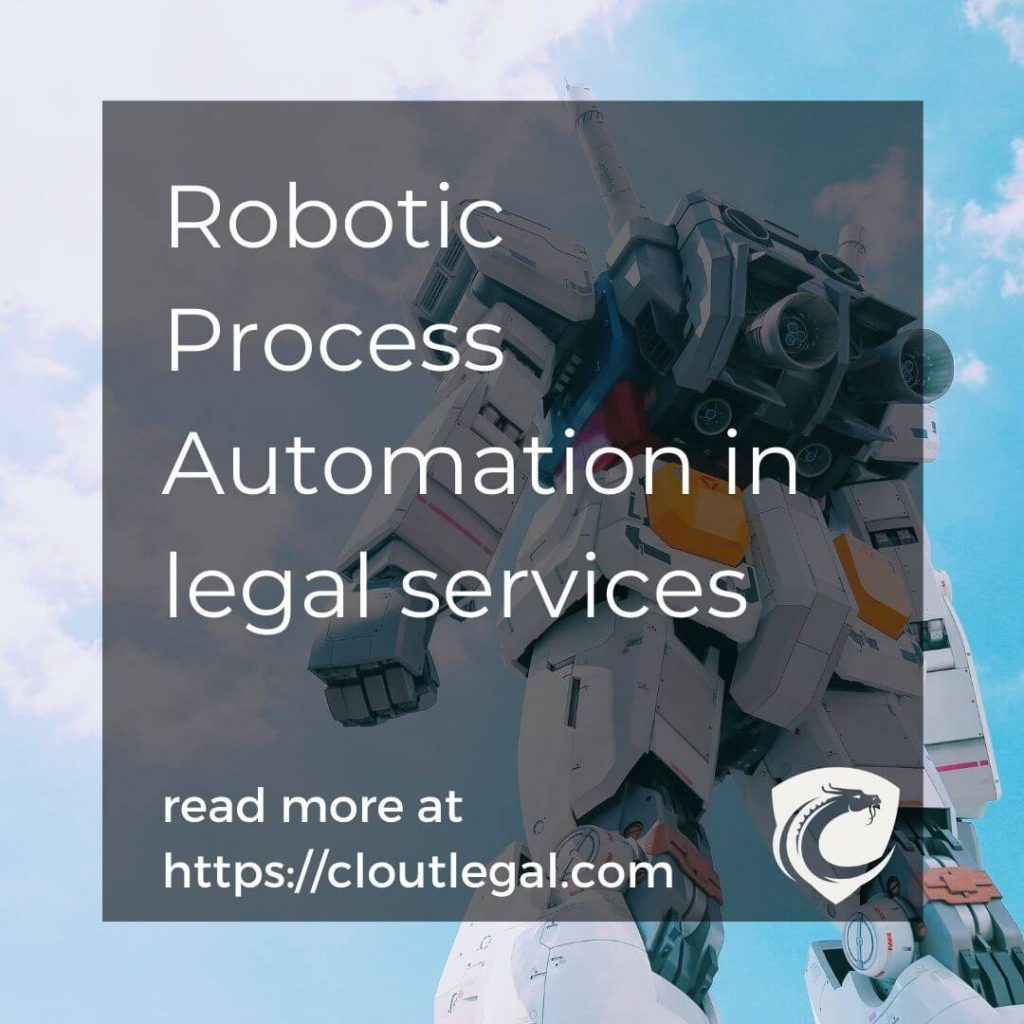How Law Firm RPA helps you be more strategic
"Everything that can be automated will be automated," according to the "First rule of Automation" that I've just made up. Nonetheless, RPA (i.e., Robotic Process Automation) in legal services has virtually unlimited applications. Use cases go well beyond producing and delivering legal solutions. But before we go into details:-
Robotic Process Automation in legal means automatically executing various repetitive tasks on a set schedule, subject to meeting certain conditions. Law firm RPA relies on tech (usually referred to as "bots") to alleviate the operational pressure.
Actually, "alleviate" is an understatement. Done right, RPA in legal can entirely take over many processes from you and put you in the controller's seat.
Our editorial team uses various RPA bots to cut down days - if not weeks - every month. That time used to go on operational tasks. Remarkably, RPA helps us focus on strategic aspects.
But why should you care about any of this?
Well, if you are interested in how you could regain days and weeks of your life, every month, and use them in some more valuable way…
(whatever “valuable” may personally mean to you)
Yeah, I will lend you a hand here. We will see in greater detail:
- robotic process automation in legal - what it is and what it’s not;
- how RPA differs from artificial intelligence;
- why it might be easier to start with RPA than AI;
- the benefits and why should you consider RPA in legal at all; and
- mention some RPA use cases in legal and law firms.
Finally, we will see where does all this lead, and how all this can affect you, in both short and the long run.
Ready?
Photo by Danielle MacInnes on Unsplash
What is(n’t) law firm RPA
As mentioned, RPA stands for Robotic Process Automation. Simply, “robots” (or “bots,” colloquially) execute mundane (yet necessary) tasks, and liberate you to do something else.
(or nothing at all, if that’s your cup of tea)
While there are different frameworks, in most, you can combine bots that focus on single task execution. By doing so, you can create chains where every next link in the chain is triggered by the previous.
A defining trait of RPA in the legal (or other sectors, for that matter) is in its autonomy. In other words, the bots and chains of bots must be able to self-execute, under certain conditions.
(in short, you should be able to leave the bots for a while, and only check them up occasionally - this works if you have set the processes and bots properly from the start)
That said, applying robotic process automation differs significantly from merely using technology like CRM, practice management, e-newsletter management (or otherwise).
Take, for example, your email newsletter management system. If you schedule a newsletter to set off at a particular time and date, it doesn't qualify as RPA. That's just using a feature of your campaign management system.
However, you might be able to set events or conditions that trigger the sending of the above newsletter. If you could leave such a system to its own devices, you could proudly say you’ve deployed robots successfully.
“But wait,” I can almost hear you, “how does artificial intelligence fit in the RPA?”
Well, I am glad you asked:-
Photo by Alvaro Reyes on Unsplash
AI, RPA, and law office automation
If we are going to be precise, we should put AI as a subset of robotic process automation.
Artificial intelligence is frequently associated with robots and bots in the broader sense. But it is commonly misunderstood by the public, and, by extension, lawyers. At times, it's likely over-glorified by legal tech companies, pundits, and publications.
John McCarthy created the term AI in 1956. He used it to label machines that mirror certain human cognitive traits (i.e., learning, thinking, remembering, problem-solving, and making decisions).
In essence, artificial intelligence represents machines (algorithms) that can analyze vast bodies of data, learn, and correct their behavior in the process.
As such, artificial intelligence depends quite a lot on the quality of data. You can't have good learning if data is sparse, or if samples aren't representative.
So far, the necessity of training and data quality (or its availability in the first place) represented significant barriers to the adoption of AI in the legal industry.
So is artificial intelligence a part of robotic process automation? Well, it could be - but it is not necessary.
As mentioned, the AI component focuses on training, learning, and adapting behavior. RPA in legal is simply about law firm process automation.
(it is entirely possible to set “unintelligent” bots in motion with high ROI)
Legal AI vs. RPA ease of use
Artificial Intelligence doesn't have to play a role in robotic process automation. Yes, you read that correctly.
For this reason (as evidenced by our Editorial team), RPA (sans AI) has a much lower barrier to adoption than its more intelligent counterpart.
So could we think of RPA as low-hanging fruit for the legal industry? Let's consider:
- RPA doesn’t require any initial training. It doesn’t require data samples; it only requires a clearly defined process and conditions;
- In some cases (if you use the right platforms) RPA may not require you to know how to code;
- The time needed to set and activate bots (sans AI) is considerably shorter than implementing a fully-fledged AI solution.
For all the above reasons, robotic process automation seems like an easy win for law firms and legal departments. All it requires is for you to see processes, map them, and delegate to bots.
There is, however, a trade-off to this simplicity. Lacking intelligence, mentioned bots aren't able to learn nor adapt. They simply follow the set process.
And while these bots can be very flexible and granular, you still need to steer them if you wish to modify their direction.
Hence, legal automation mostly fits the operational aspects of the business of law. But we will talk more about RPA use-cases in legal below.
Photo by Rock'n Roll Monkey on Unsplash
Lawyer bots and RPA in the legal industry
Perhaps the most common association to "bots" and AI are legal chatbots. However, they frequently have very little in common with RPA and close to none with AI.
At least of those that I've seen, lawyer bots are rule-based systems, where rules have to be set by users (i.e., lawyers and law firms that deploy them). More often than not, there isn't any learning component, so any AI classification often goes out of the window.
You could still argue that lawyer chatbots are a KIND of an RPA, limited to the chat function. As such, they might be useful in facilitating and speeding up communication. However, as always, their effectiveness depends on set rules.
I feel it is fair to say that legal chatbots are a stripped-down version of RPA.
Why is that, you ask?
Well, only due to their (by and large) narrow focus on communication. RPA platforms that I've seen (and some of them use daily) hold much more horsepower and a much broader scope.
Some no-code platforms have many modules that could be combined to execute complex chains of operation. Even without the learning part, the level of granularity these provide is pretty impressive.
Lawyer automation and RPA
No, that’s not how it works. RPA, nor AI, for that matter, is not automating lawyers. They never will.
Robotic process automation is automating processes. It is in the name, after all.
Lawyers don’t need to be automated. You need liberation from mundane tasks. And if any framework has the potential to set you free, it is the RPA.
As you regain your time to use it as you deem best, you get your chance to spend more time thinking strategically about many aspects of your business of law.
You are not being automated. You are evolving.
Photo by Clarisse Croset on Unsplash
Benefits of RPA and law firm automation
“If there only were more hours a day,” said no one ever. Oh, wait…
What would you and your team do with all the extra time? I guess it boils down to that question since this is what you effectively get by automating law firm processes.
Law firm process improvement
Now, you might be wondering, “what is there left to improve, if we’ve already RPA-ed our processes? Wasn’t automation the end goal?”
All the efficiency is already there, right?
Well...the thing is, efficiency was never an end goal (it might be to those highly inefficient). Efficiency is an instrument that helps you achieve higher-level goals.
With all the additional time, you may shift your focus from measuring process efficiency to observing their effectiveness.
Who knows, you just might be very efficient at doing all the wrong things. Now, this is your chance to optimize processes, so they deliver the most impact with every thrown punch.
For example, how effective are your media campaigns? What are your conversion rates? What is your Net Promoter Score? In other words, how excited are clients about your services?
Are your legal products performing well? Or did you miss the mark?
There are so many questions to ask, every single day when running a business. The beauty of RPA is - it gives you the freedom to focus your mind on strategy and growth hacking (if you fancy that term from the startup world).
Robots manage; leaders lead. Let the bots do what they are best at, while you grow and redefine your and your business's limits.
People and team culture
How much time do you spend thinking about your people? Are they are satisfied with where they are at? Do they feel engaged?
If you answered "plenty," more power to you, I guess. But I know lots of organizations that couldn't say the same in a straight face. And I am sure you do as well.
(and then we wonder why BigLaw generally has high people churn)
If you find the time to really think about this aspect, you will spot many opportunities to make people feel involved and at home (as far as professional services firms go, at least).
Photo by Simon Abrams on Unsplash
Strategic thinking and creativity
Where would you like to lead your business of law next? Would you explore new business avenues, productize your legal services, or create a compliance tool? Is there anything else that would require your immediate attention?
What else could you do for your branding? Advise pro bono? Write a book, perhaps?
There are no right or wrong answers here - the key is in exploring creativity. Who knows where you might end.
RPA use-cases in legal services (no AI)
Robotic process automation, sans AI, is low-hanging fruit that can take over operational tasks that require little to no steering (unless occasionally, as you evolve your processes).
(however, it is also possible to build a rudimentary, yet quite a functional bot that will monitor your database and warn about important dates like trademark renewal dates, for example)
As such, you may consider “unintelligent” RPA to delegate the following:
Data checks, copying, updating, or deletion
If you work with lots of data in excel sheets, you can set bots to automatically copy, delete, or update specific rows and cells. Moreover, bots can read the data therein and send it to the next link in the chain for further processing.
An example of further processing would be to publish data, use it in an equation (if the value is numerical), or send it via email where relevant.
Generate content (documents, pages, newsletter)
Yes, bots can generate content just fine if you supply data and rules. For example, bots can assemble data pulled from various sources and put it into a sheet, doc, or PDF. The same goes for sending emails or newsletter campaigns.
Monitor business development effectiveness
Bots can pull data from various sources, and one such source is Google Analytics (and ancillary services like Adwords, etc.).
Bots can further copy said data into sheets, which can automatically calculate all the rates and numbers you need to know, per set formulas.
If you schedule such bots to work daily, you will get an up-to-date picture of your legal business development funnels, without having to go to the GA dashboard in the first place.
Social Media presence
Many pundits and social media advisers go against automating your social media presence.
And I guess they do have a point - it makes no sense to be perceived as a robot online. However, and this is often overlooked, I don't feel this discussion should be about full automation vs. no automation at all.
We could argue to which degree it makes sense to automate. But if you don't do any automation at all, you are either missing on opportunities to be seen online, or spending a considerable chunk of time to manage your online presence.
(whether you do it personally, or your team, it doesn’t matter - the point remains)
So if you opt to do so, you could probably automate roundabout 80% (if not more) of social media posts. Here’s a quick check - if you share:
- industry findings, survey and research results, or news;
- insights and best practices from your team;
then yes - indeed - you can automate those to a very high degree with RPA.
You just need to be strategic about it. While it is beneficial to use robots, there’s no reason to be seen as one.
If you wish to learn how we use RPA in our team, drop a line at editorial(at)cloutlegal(dot)com - happy to walk you through the process.
Team culture, events, and cohesion
As your team grows, it becomes more challenging to keep abreast of all that is going on with your people. Much like with social media, you aren't able (nor should you) automate everything.
But at least it would be helpful if you could:
- send birthday reminders, birthday greetings, or other important company events (can be incorporated in your cross-team chat tools, be it Teams, Discord, Slack or others);
- share intra-company surveys, collect and arrange data.
Photo by Charles Deluvio on Unsplash
RPA contract management system
As mentioned above, when compared to AI, RPA would be a more rudimentary choice for building a contract management system. However, the positive side of it is faster deployment time, once you take out the learning part from the equation.
(there will be, however, more and more advanced AI systems that would eventually require very little initial training - that could eliminate deployment advantages of RPA in legal over time)
With RPA, you could follow your database and set alerts or other kinds of actions triggered upon specific dates. RPA bots might be useful to stay abreast of critical contractual terms, trademark renewals, or other similar examples.
RPA and (some) legal project management aspects
From what I've seen so far, you can set some actions to help you manage your workflow. For example, add emails (all, or some that meet certain conditions, like the subject, etc.) as cards to your project boards.
Law firm RPA, legal billing and invoicing
RPA platforms are very good at pulling data from various sources. Thus, you are perfectly able to extract data into excel or google sheets, calculate them, and copy into pre-set templates for invoicing.
Robots can also copy other variable data into the template mentioned above. Following that, bots would generate a PDF that you can send out to clients after the internal checks.
Finally, bots can automatically crunch all the financial metrics and numbers that you would want to follow. For example, you could even set them to send you a digest every once in a while (e.g., weekly, monthly, or otherwise).
RPA and AI use-cases in legal services
With AI, RPA holds much more power under the hood. In addition to the automatic triggering of workflows, the cognitive component would allow the machine to learn and adjust its behavior.
Contract analysis
If you embed your know-how into AI algorithms, you could very practically offer scalable contract analysis services.
An excellent example of this use-case is Marko Porobija and his law firm - they have deployed AI, trained it, and are now offering preliminary analysis of various commercial agreements entirely online.
Their business model is a subscription, mimicking all the SaaS best practices.
You can read their story here.
Photo by Markus Spiske on Unsplash
Document drafting
Some AI RPA initiatives focus on drafting documents and producing litigation materials of high quality. By doing so, they claim they can complete complex operations (that take hours) in mere minutes.
Case and matter intake management
Legal professionals often have to tackle cases with a vast volume of unstructured data, documents, and records. Sifting through all the files, therefore, is a challenge that takes a considerable effort.
It is very costly to assign humans to review and classify every single record manually. Luckily, this is one of the areas where RPA with AI can assist.
Practically, artificial intelligence would review a sample of documents and spot specific patterns there. Based on those, it can classify and group documents and records that hold similar traits to those in the sample. Naturally, as the cycle of analysis, classification, and feedback loops, the AI would learn and increase its precision rate.
Law Firm RPA and AI in due diligence
Due diligence is another activity that AI can assist quite significantly. In addition to document classification, some AI initiatives can flag potential risk areas in a contemplated transaction.
Of course, given all the risks, lawyers still have to supervise these results. However, it is a tool that takes over many tedious tasks and allows lawyers to focus on the risk aspects of the analysis.
RPA and AI law firm business development
I have recently seen one tool that leverages IBM Watson Ⓡ, which helps with online outreach and building relationships.
Without going into details, the tool’s effect is that it mimics a small team that works for you. It builds connections as per your target audience, and analyses your audience’s sentiment towards what you have to offer or communicate.
I, for one, was quite impressed by its potential in this very significant discipline.
AI and law firm invoicing
We've already touched above on how RPA can assist with issuing law firm invoices. The AI component would add on top of what "unintelligent" RPA can do, and bring in its cognitive traits.
For example, the AI could observe any patterns in the differences between draft invoices and finalized invoices. It could conclude that in particular transactions or task codes, law firms usually trim some "fat" from the initial billing reports (a common practice in law firms that bill by the hour).
Additionally, it could determine the “standard deviation” between the billing report and final invoice amounts. Such conclusions would enable AI to suggest invoice corrections proactively, and assist biglaw billing department teams.
Photo by Marcos Paulo Prado on Unsplash
How should you start with RPA and where
So, now that we’ve seen the potential of robotic process automation in legal services and law firms’ management, what to do next?
As in any innovation project (in legal, or otherwise), you should take some time to reflect and understand what is truly important to you.
And, more importantly, why.
Exploration stage
You probably already know what problems you would like to solve with legal automation. Think of bottlenecks in your organization, and how would you benefit from fixing those.
Understanding processes is the most critical aspect of your planning session. You can only delegate or automate what you understand.
You would also need to decide what tech stack you would use to automate your processes. This will naturally depend on your goals, capacity, yours, or your team's tech skills, etc.
There are few low to no-code platforms that can provide an excellent initial RPA toolbox. It is incredible what you can do today without having to write a single line of code.
(of course, you would be more potent still if you do decide to try your hand at coding)
Low hanging fruit and early wins
AI has vast applications already, and many more are being explored as we speak. Thus, the list of problems you could solve with AI is pretty open - at least theoretically.
Practically, though, it makes the most sense to focus on areas that you know best and where you feel the most pain. For example, those could be some data administration, or social media (those are solvable without any AI - basic RPA would do just fine).
Find some processes where you will immediately feel the ROI as soon as you deploy the bots. As you gain experience in automation, you will feel more confident to solve complex processes, and, eventually, consider AI for even greater optimization.
AI has its place, of course, but it seems we are often trying to jump before we've learned how to crawl. RPA might be our way to yield exponential benefits by mere crawling...
Maintenance, control, optimization
Once you have deployed bots, you can, by and large, devote your time elsewhere. You would still have to be in the driver's seat and make sure bots execute as initially planned.
Most of the platforms have alerting systems (e.g., emailing you if something goes wrong), so you will know immediately if any of the deployed bots require your attention. My experience, so far, has been nothing but flawless in this regard.
Over time, as you learn from the execution, you will likely want to "evolve" your robots.
Is legal RPA right for you?
It depends, I guess? What would you do if bots would take care of some of the more tedious tasks? How would you enjoy all the additional time? Finally, these answers would tell you if you should consider automation for yourself or your legal services team.
Photo by My name is Yanick on Unsplash
Frequently Asked Questions
What is legal automation?
Automation in legal means automatically executing tasks, per a set schedule and conditions. Law firm RPA (short for Robotic Process Automation) is another way of referring to legal automation.
Will lawyers be automated?
Robotic Process Automation (RPA) or Artificial Intelligence (AI), as RPA's subset, do not automate people, but processes. Lawyers must have a design and driving role in any automation initiative.
Will automation replace lawyers?
Automation in legal can’t replace lawyers. Neither RPA nor AI can render legal services, from start to end. Robotic process automation takes over some mundane tasks, but it needs supervision.
Can computers replace lawyers?
Even deep learning AI needs setup, direction, and supervision to serve its purpose. Tech tools are most effective when they assist lawyers in making judgment calls. Lawyers remain in the driving seat.
Will there be a need for lawyers in the future?
Lawyers will change their workflow, and delegate a good chunk of their current tasks to machines. Lawyers will design legal solutions or have similar roles that would let their creativity shine.
Ivan Rasic holds the Transnational Trade Law and Finance LLM, a program by Universidad de Deusto (Bilbao, ES), Universiteit van Tilburg (Tilburg, NL), and Goethe Universität (Frankfurt, DE). After his work in law firms and inhouse, he started a legal tech company.
Nowadays, Ivan leads STP Informationstechnologie GmbH's Sofia RnD center with project/development management, culture, strategy, and special project initiatives.
Ivan is an Ambassador at European Legal Tech Association (ELTA). He closely follows and writes on future of law, legal tech, ALSPs, and new ways of delivering legal services.
Ivan Rasic holds the Transnational Trade Law and Finance LLM, a program by Universidad de Deusto (Bilbao, ES), Universiteit van Tilburg (Tilburg, NL), and Goethe Universität (Frankfurt, DE). After his work in law firms and inhouse, he started a legal tech company.
Nowadays, Ivan leads STP Informationstechnologie GmbH's Sofia RnD center with project/development management, culture, strategy, and special project initiatives.
Ivan is an Ambassador at European Legal Tech Association (ELTA). He closely follows and writes on future of law, legal tech, ALSPs, and new ways of delivering legal services.












